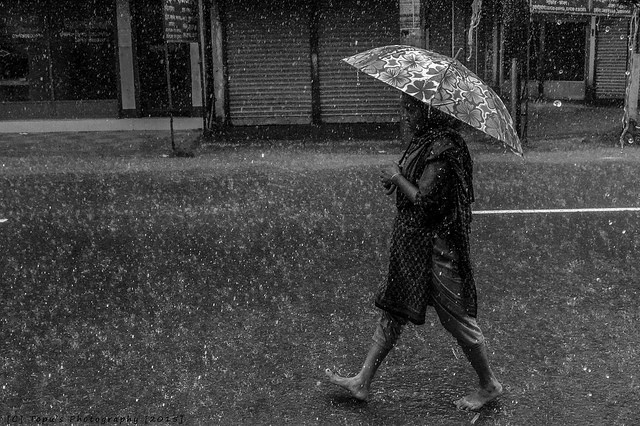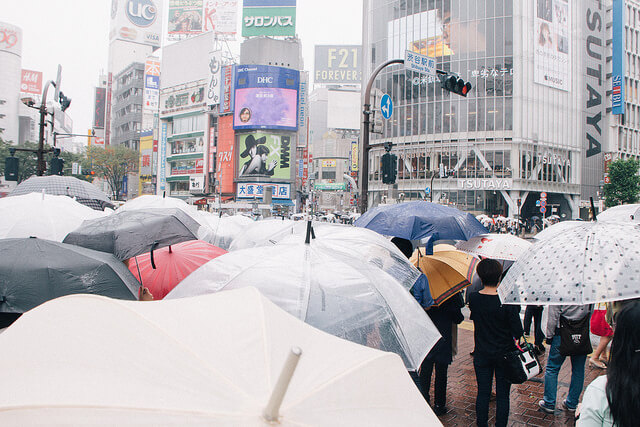
5 awful things about Japan's rainy season
The rainy season, or tsuyu, is one of Japan's worst seasons for all its rain and humidity. While you can sometimes look on the bright side (see the related article) of tsuyu, there are just some things that can't be ignored.
This post may contain affiliate links. If you buy through them, we may earn a commission at no additional cost to you.
What is the Japanese rainy season?
Japan's rainy season called tsuyu or baiu usually begins in early May in Okinawa. In other regions, it runs from early June through around mid July. Hokkaido, the northernmost prefecture of Japan, officially does not have tsuyu, although some parts experience consecutive cloudy and chilly days resemble tsuyu in early summer. Its weather tends to be nicer than other regions of Japan.
The weather during tsuyu is unstable. It is important to prepare for rain at anytime. Although it's typically rainy with lower temperatures, sometimes it has less rain and can be hot.
...The main problem during the rainy season is the humidity. People tend to become irritated by it. Taking a bath or shower often helps you keep comfortable. Also, things are easily covered by mold. If you are staying in Japan, it is important to air your closets or houses when the sun is out. As many cases of food poisoning occur during this season, it's also important to watch out what you eat and not to leave food out of the refrigerator.
1. The rain
During tsuyu, it rains so often that a day where it doesn't rain is rare. It may not rain every day, but it will probably feel like rain every single day. The hot, humid, rainy weather is enough to make anyone insane, and it lasts for an entire month.
2. The humidity
One of the most hateful things about tsuyu is the humidity. As if it isn't enough that the summers in Japan are unbearably humid, the humidity in tsuyu is ridiculous because of all the rain and heat. It isn't uncommon for people to carry around extra shirts or pants to change into during the day, and it also isn't strange for most people to take two showers a day during tsuyu.
3. The mold and food poisoning
The rainy season, which runs roughly from June through July, is called tsuyu. Because it frequently rains for several days in a row, we must be careful about mold or food poisoning that might harm to our health.
Main Points in Preventing Mold
Ventilate your home by opening the windows and using a ventilating fan.
(However, on rainy days, this would have the reverse effect because you would be letting humidity into your home.)
The bathroom is where mold develops most easily. After washing the walls carefully, you should wipe them down thoroughly with a dry towel and ventilate the bathroom.
Clean the filter of your air conditioner frequently.
Do not hang your laundry indoors.
Main Points in Preventing Food Poisoning
Disinfect your kitchen utensils with hot water or bleach and dry them completely.
Place food in containers with lids or wrap them in plastic food wrap.
Note: You need to be especially careful about food that is eaten raw. In addition, because children have a low resistance to food poisoning, be careful when feeding them raw food and eggs.
When shopping for groceries, be sure to check the expiration date and purchase the freshest items available.
4. The instability of the weather
While tsuyu is the rainy season, the weather can also be extremely unpredictable. It may be sunny when you wake up and pouring by the time you leave the house, or it may rain heavily, then suddenly become sunny for a few minutes, then rain again. For this reason, it is imperative to always carry around an umbrella or a raincoat.
5. The trains
When it rains in Japan, the insides of the trains can get super gross. Everyone has their wet umbrellas and coats and is tracking wet dirt into the cars with their shoes, plus the humidity of the rainy season makes the cars stuffy and smelly with rain and sweat. This is especially the case during the morning rush hour trains when everyone is packed together.
The information in this article is accurate at the time of publication.








